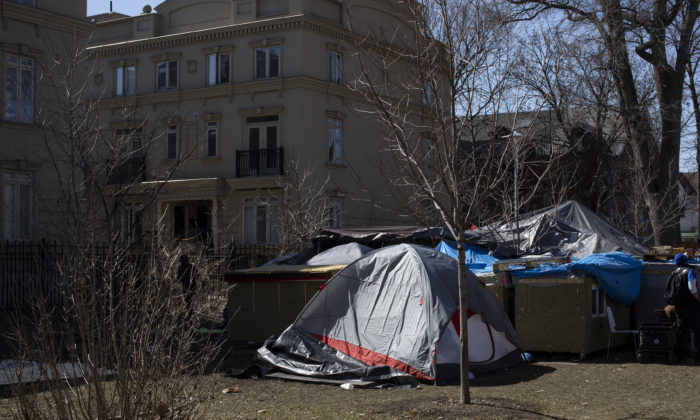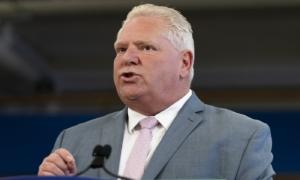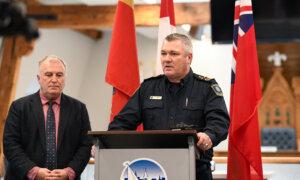Ford Vows to Utilize Notwithstanding Clause to Protect Cities From Judicial Oversight Regarding Homeless Encampments
Ontario Premier Doug Ford has announced plans to use the notwithstanding clause to prevent the courts from interfering with municipalities’ efforts to dismantle homeless encampments.
The pledge comes alongside robust legislation to crack down on both homeless encampments and the public drug use that has become prevalent at many of them.
The legislation and Ford’s promise to use the notwithstanding clause comes in response to a request from 12 cities asking the province for help in tackling both encampments and the addictions crisis.
The letter, addressed to the mayors of Barrie, Brampton, Brantford, Cambridge, Chatam-Kent, Clarington, Oshawa, Oakville, Pickering, St. Catherines, Sudbury, and Windsor, said the province would address public disorder, drug use and trafficking, and the loss of public space in its encampment legislation.
There has been a marked escalation in homelessness and the presence of encampments in the past five years, leaving cities and towns across the province struggling to deal with both the unhoused and an escalating number of drug overdoses.
Ford said the legislation would help to address both issues.
“These are serious problems that are impacting communities across Ontario, with people rightly demanding action,” Ford said. “Enough is enough.”
The premier’s pledge comes several weeks after the 12 mayors penned a letter to Ford asking him to strengthen trespass laws, ban public drug use, and bolster involuntary addiction treatment laws. They also asked the province to be prepared to intervene with the courts as needed as municipalities work to dismantle encampments.
Ford said the new legislation would “explicitly and unequivocally” prohibit the public use of illegal drugs and that new tools and authorities would be offered to help police enforce the law.
Stricter penalties will be imposed on individuals who intentionally and repeatedly break the law and new approaches to treatment and rehabilitation will be implemented, Ford said.
The premier added that he does not anticipate having to use the notwithstanding clause, a legislative tool which has the capacity to override the Canadian Charter of Rights and Freedoms.
“However, should the courts interfere with our shared goal of effectively addressing and clearing out encampments using these enhanced tools, with your support, our government is fully prepared to use the notwithstanding clause,” Ford wrote.
“This includes the province becoming an intervener in any court case that restricts the ability of municipalities to regulate and prohibit encampments, so long as the approach you pursue is aligned with provincial best practices.”
St. Catharines Mayor Mat Siscoe described the provincial response as important steps toward addressing the “homelessness, opioid and mental health crises in Ontario.”
Barrie Mayor Alex Nuttall said the legislation would help to put “necessary support systems” in place for those impacted by the homeless and drug crises.
NDP Leader Marit Stiles said the legislation will not address the problem because the homeless will continue to move to new areas as long as there is no housing for them. She said the government should put its focus on shelters and housing instead.
“What are you going to do, move them on to another park?” she said. “The truth is, we have to have a place for people to live, a shelter for them to stay in, and unless we have that, this is going to continue.”
Provincial Plans
The province has adopted a new approach in recent months to deal with the issues of homelessness and addiction and has earmarked nearly $700 million annually toward homelessness prevention programs.
Five sites will shut down in Toronto, as well as one each in Guelph, Hamilton, Kitchener, Ottawa, and Thunder Bay. Nine of those sites are provincially funded and will be eligible to receive funding under HART Hubs, a new $378 million homeless and addiction program that the province says will prioritize community safety, treatment, and recovery. The sites must give up supervised consumption services to receive funding under the new system.
The money will be used to create 19 homelessness and addiction recovery treatment hubs and up to 375 supportive housing units.
Ford has been adamant that safe injection sites do little to help with public drug use and overdoses.
“Giving someone, an addict, a place to do their injections—we haven’t seen it get better,” Ford said during a press conference earlier this year. “This was supposed to be the greatest thing since sliced bread. It’s the worst thing that could ever happen to a community to have one of these safe injection sites in their neighbourhood.”
The Canadian Press contributed to this report.





